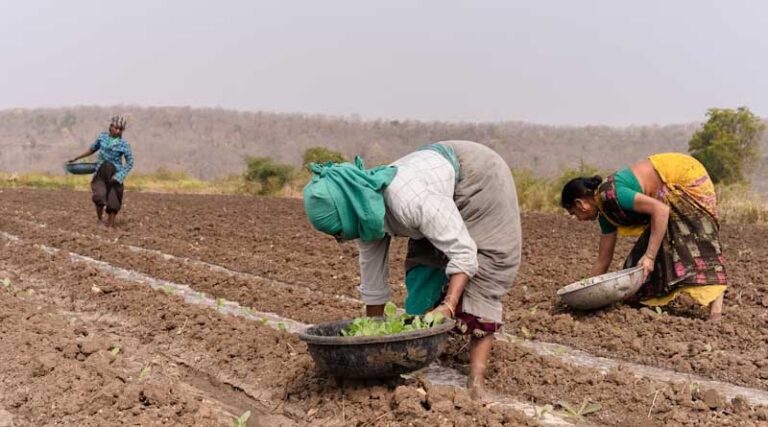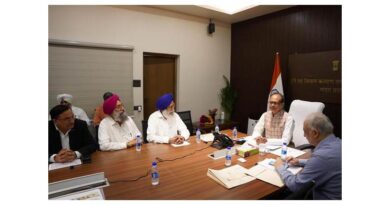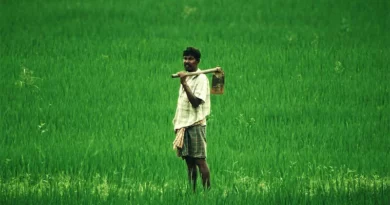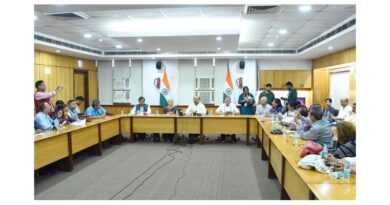
Cotton Sowing Declines While Overall Kharif Coverage Crosses 708 Lakh Hectares in India
22 July 2025, New Delhi: The Ministry of Agriculture & Farmers Welfare has released the latest data on Kharif crop sowing progress across India as of July 18, 2025, indicating a promising start to the agricultural season. The total Kharif acreage stands at 708.31 lakh hectares, an increase of 27.93 lakh hectares over the same period last year. While key crops like rice, pulses, and coarse cereals have witnessed expansion in area, cotton sowing has declined by over 3 lakh hectares.
Rice Leads with 19.47 Lakh Hectare Growth
Rice, the principal Kharif crop for India, continues to dominate the acreage figures. As of the current reporting period, rice has been sown on 176.68 lakh hectares, up from 157.21 lakh hectares last year, reflecting a strong increase of 19.47 lakh hectares. This surge comes amid improved rainfall distribution across the eastern and southern belts, encouraging early transplantation and direct seeding in several regions.
Cotton Shows Decline Amid Price and Weather Concerns
Contrary to the overall growth trend, cotton coverage has dipped, with the area under cultivation recorded at 98.55 lakh hectares, down from 102.05 lakh hectares in 2024—a decline of 3.49 lakh hectares. Farmers in parts of Maharashtra and Telangana have reportedly shifted acreage towards pulses and maize due to delayed monsoon onset and price volatility witnessed in the cotton trade last year.
Pulses: Gains in Moong and Moth Bean Offset Declines in Urad and Tur
The total area under pulses has increased modestly to 81.98 lakh hectares from 80.13 lakh hectares in the previous year. However, a closer look reveals mixed trends:
- Moong (Green Gram) saw a substantial rise to 27.31 lakh hectares from 24.52 lakh hectares, adding 2.79 lakh hectares.
- Moth Bean also jumped to 7.56 lakh hectares from 4.95 lakh hectares, a gain of 2.61 lakh hectares.
- Conversely, Urad (Black Gram) and Tur (Pigeon Pea) witnessed area contractions of 2.06 lakh hectares and 1.61 lakh hectares, respectively.
| Crop | 2025 Area | 2024 Area | Change |
|---|---|---|---|
| Tur | 30.09 | 31.70 | -1.61 |
| Kulthi | 0.14 | 0.12 | +0.01 |
| Urad | 14.45 | 16.51 | -2.06 |
| Moong | 27.31 | 24.52 | +2.79 |
| Other Pulses | 2.43 | 2.33 | +0.10 |
| Moth Bean | 7.56 | 4.95 | +2.61 |
| Total | 81.98 | 80.13 | +1.84 |
Coarse Cereals: Big Push in Maize and Bajra Drives Segment Growth
Coarse cereals recorded a strong growth of 15.99 lakh hectares, reaching 133.65 lakh hectares in 2025, compared to 117.66 lakh hectares last year. This increase is largely attributed to:
- A surge in Maize sowing, now at 71.21 lakh hectares, up 9.48 lakh hectares.
- Significant growth in Bajra (Pearl Millet) area, reaching 48.94 lakh hectares, up 6.85 lakh hectares.
| Crop | 2025 Area | 2024 Area | Change |
|---|---|---|---|
| Jowar | 9.99 | 9.81 | +0.18 |
| Bajra | 48.94 | 42.09 | +6.85 |
| Ragi | 1.42 | 1.70 | -0.28 |
| Maize | 71.21 | 61.73 | +9.48 |
| Other Millets | 2.09 | 2.34 | -0.25 |
| Total | 133.65 | 117.66 | +15.99 |
Oilseeds: Soybean Declines Sharply; Groundnut and Sesamum Expand
The oilseeds segment has seen a net decline of 6.04 lakh hectares, with the total area standing at 156.76 lakh hectares against 162.80 lakh hectares last year. The fall is primarily driven by:
- A 7.29 lakh hectare decline in Soybean sowing, which dropped to 111.67 lakh hectares from 118.96 lakh hectares.
- Nigerseed also saw a steep drop of 0.20 lakh hectares.
However, there are some bright spots:
- Groundnut expanded to 38.01 lakh hectares, up by 0.86 lakh hectares.
- Sesamum increased marginally to 6.04 lakh hectares.
| Crop | 2025 Area | 2024 Area | Change |
|---|---|---|---|
| Groundnut | 38.01 | 37.16 | +0.86 |
| Sesamum | 6.04 | 5.58 | +0.46 |
| Sunflower | 0.54 | 0.55 | -0.02 |
| Soybean | 111.67 | 118.96 | -7.29 |
| Nigerseed | 0.02 | 0.22 | -0.20 |
| Castorseed | 0.43 | 0.28 | +0.15 |
| Other Oils | 0.05 | 0.05 | 0.00 |
| Total | 156.76 | 162.80 | -6.04 |
Sugarcane and Jute-Mesta Remain Largely Stable
Sugarcane continues to perform steadily with an area of 55.16 lakh hectares, slightly higher than 54.88 lakh hectaresin 2024. The perennial nature of the crop ensures stable sowing patterns.
Jute and Mesta coverage has dropped marginally to 5.53 lakh hectares, down from 5.65 lakh hectares.
| Crop | 2025 Area | 2024 Area | Change |
|---|---|---|---|
| Sugarcane | 55.16 | 54.88 | +0.29 |
| Jute | 5.33 | 5.43 | -0.11 |
| Mesta | 0.20 | 0.21 | -0.01 |
Kharif Coverage Surpasses 708 Lakh Hectares
The total sown area under all Kharif crops in India as of July 18, 2025, stands at 708.31 lakh hectares, an increase of 27.93 lakh hectares compared to 680.38 lakh hectares in 2024.
All India Kharif Crop Sown Area – As on 18 July 2025
| Crop | Normal Area (2019–2024 Avg) | Area Sown 2025-26 | Area Sown 2024-25 | Difference (2025-26 vs. 2024-25) |
|---|---|---|---|---|
| Rice | 403.09 | 176.68 | 157.21 | +19.47 |
| Total Pulses | 129.61 | 81.98 | 80.13 | +1.84 |
| – Tur (Arhar) | 44.71 | 30.09 | 31.70 | -1.61 |
| – Kulthi | 1.72 | 0.14 | 0.12 | +0.01 |
| – Urad | 32.64 | 14.45 | 16.51 | -2.06 |
| – Moong | 35.69 | 27.31 | 24.52 | +2.79 |
| – Other Pulses | 5.15 | 2.43 | 2.33 | +0.10 |
| – Moth Bean | 9.70 | 7.56 | 4.95 | +2.61 |
| Total Coarse Cereals | 180.71 | 133.65 | 117.66 | +15.99 |
| – Jowar | 15.07 | 9.99 | 9.81 | +0.18 |
| – Bajra | 70.69 | 48.94 | 42.09 | +6.85 |
| – Ragi | 11.52 | 1.42 | 1.70 | -0.28 |
| – Maize | 78.95 | 71.21 | 61.73 | +9.48 |
| – Other Small Millets | 4.48 | 2.09 | 2.34 | -0.25 |
| Total Oilseeds | 194.63 | 156.76 | 162.80 | -6.04 |
| – Groundnut | 45.10 | 38.01 | 37.16 | +0.86 |
| – Sesamum | 10.32 | 6.04 | 5.58 | +0.46 |
| – Sunflower | 1.29 | 0.54 | 0.55 | -0.02 |
| – Soybean | 127.19 | 111.67 | 118.96 | -7.29 |
| – Nigerseed | 1.08 | 0.02 | 0.22 | -0.20 |
| – Castorseed | 9.65 | 0.43 | 0.28 | +0.15 |
| – Other Oilseeds | – | 0.05 | 0.05 | 0.00 |
| Sugarcane | 52.51 | 55.16 | 54.88 | +0.29 |
| Total Jute & Mesta | 6.60 | 5.53 | 5.65 | -0.12 |
| – Jute | 6.19 | 5.33 | 5.43 | -0.11 |
| – Mesta | 0.40 | 0.20 | 0.21 | -0.01 |
| Cotton | 129.50 | 98.55 | 102.05 | -3.49 |
| Grand Total | 1096.65 | 708.31 | 680.38 | +27.93 |
India’s Kharif season has so far shown a positive momentum, with strong gains in rice, pulses, and coarse cereals. However, declines in cotton and soybean highlight the effects of seed unavailability, climatic uncertainty and market dynamics on farmers’ sowing decisions. With the monsoon entering a crucial phase, the coming weeks will determine whether the upward trend in acreage translates into bumper yields and stable commodity prices.
Also Read: Sona Machinery Expands Its Presence in Nepal With a Turnkey Rice Mill and Parboiling Dryer Plant
📢 If You’re in Agriculture, Make Sure the Right People Hear Your Story.
From product launches to strategic announcements, Global Agriculture offers unmatched visibility across international agri-business markets. Connect with us at pr@global-agriculture.com to explore editorial and advertising opportunities that reach the right audience, worldwide.






